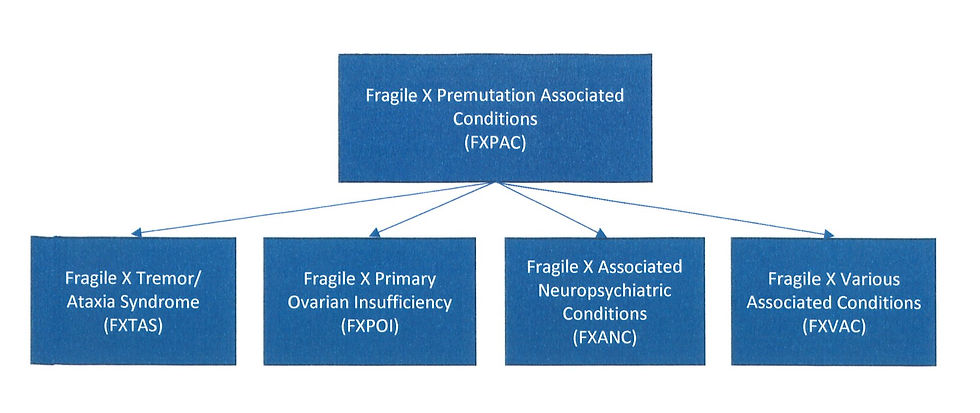Fragile X Premutation Associated Conditions (FXPAC) Statement
- Jan 30, 2020
- 4 min read
Updated: Dec 17, 2021
The Fragile X Society (UK) is part of a network of Fragile X organisations from across Europe who meet annually to discuss key issues relating to Fragile X and to learn from one another.

The European Fragile X Network (EFXN), at their meeting in Rotterdam, The Netherlands, on 29 September 2019, discussed the term FXAND (Fragile X Associated Neuropsychiatric Disorder) and recent research on conditions which affect Fragile X premutation carriers.

In their discussions, they identified several concerns:
The term FXAND (Fragile X Associated Neuropsychiatric Disorder), by including auto-immune conditions and neuropsychiatric conditions under a single term, was not helpful.
FXAND, with the inclusion of the word disorder, can lead to stigmatisation of the premutation carrier, including social or professional exclusion. Using "condition" rather than "disorder" would be much preferred by the EFXN as it is broader language and not limiting.
EFXN, therefore, proposes the creation of an overarching term to cover issues relating to being a carrier: Fragile X Premutation Associated Conditions (FXPAC). Under that general heading, specific conditions will be
FXTAS (Fragile X Tremor/Ataxia Syndrome)
FXPOI (Fragile X Primary Ovarian Insufficiency)
FXANC (Fragile X Associated Neuropsychiatric Conditions), replacing the word ‘disorder’ in FXAND, with ‘conditions’;
FXVAC (Fragile X Various Associated Conditions) for any other non-psychiatric conditions (such as auto-immune conditions, chronic fatigue, fibromyalgia, etc.) which should not be included in FXANC but referred to as FXVAC.

It is accepted that further research might define these terms more precisely and/or add to them. Also, the inter-relation between the various FXPAC conditions is not understood, with some carriers seemingly being unaffected, and others having a combination of conditions affecting them.
Since the September 2019 meeting, the individual Fragile X family organisations of European countries have approved the adoption of the terminology FXPAC. The European Fragile X Network respectfully asks researchers and clinicians to adopt FXPAC when generally referring to conditions that may affect pre-mutation carriers.
Having a unified term (FXPAC) gives a doctor, when helping someone with the pre-mutation, a starting point for looking at the array of conditions which may or may not affect a particular pre-mutation carrier. Further, it will encourage researchers to explore the interactions between these conditions.
Q&A
Background
Research is ongoing into the conditions which affect Fragile X premutation carriers. Established conditions associated with the premutation include Fragile X-Associated Tremor/Ataxia Syndrome (FXTAS) and Fragile X Primary Ovarian Insufficiency (FXPOI). However, recent research suggests that people who are premutation carriers also experience some mental and physical health symptoms at higher rates than in the general population, which are not encompassed by FXTAS or FXPOI. This has been identified through studies with people who are aware that they are Fragile X Premutation Carriers (typically with a child with Fragile X Syndrome, for instance: https://www.ncbi.nlm.nih.gov/pmc/articles/PMC4121434/) and, more recently, in research which involved looking at the health records large sample of people in the general population (https://advances.sciencemag.org/content/5/8/eaaw7195), some of whom were premutation carriers. It is important that further research is done to fully understand all the possible effects of the Fragile X Premutation, in order to improve recognition, understanding and support for all people with the Fragile X premutation.
What symptoms are associated with FXPAC?
Though research is ongoing, the following symptoms (in addition to those associated with FXTAS or FXPOI) have been found to occur in higher rates in people with the Fragile X Premutation:
Anxiety, and anxiety disorders
Low mood and depression
Elevated traits related to autism, such as differences in the processing of social information and use of social (pragmatic) language. Of note, this refers to subtle characteristics that occur to varying degrees in the general population rather than symptoms of autism, per se. Although, in a small number of individuals a diagnosis of autism might be appropriate.
Physical health symptoms such as chronic fatigue, chronic pain, fibromyalgia, autoimmune disorders and sleep problems have also been identified at higher rates in people with the Fragile X premutation.
It is important to highlight that many of these symptoms are also common in the general population. However, this emerging research suggests that people with the premutation may be at higher risk of some of the above symptoms. In addition, for many, these traits may present in subtle ways that do not affect day-to-day life. Though, a proportion of people who are Fragile X Premutation carriers will experience symptoms to the extent it has a negative impact for them. Being a carrier does not mean that these symptoms are inevitable, and treatment should be sought for these symptoms, as for anyone in the general population. However, the aim of investigating these effects is to understand why these symptoms are occurring and how they may be linked, explore possibilities of more targeted treatments, helping those with the premutation to understand their experiences and ensure proper assessment and recognition by doctors.
What is FXPAC?
FXPAC stands for Fragile X Premutation Associated Conditions. This term has been proposed to describe the wide range of symptoms which may affect pre-mutation carriers.
Why was FXPAC introduced?
There is a need for a term which encompasses conditions affecting Fragile X premutation carriers.
FXPAC will aid researchers who wish to explore how the premutation affects carriers. It will help carriers who experience a range of conditions and wish to have a medical diagnosis.
Where can I find more information?
More information on carrier issues is available via the Fragile X Society. You can contact our Families and Professionals Advisors on info@fragilex.org.uk or 01371875100 (Option 1).
Click here for a print-friendly version.
